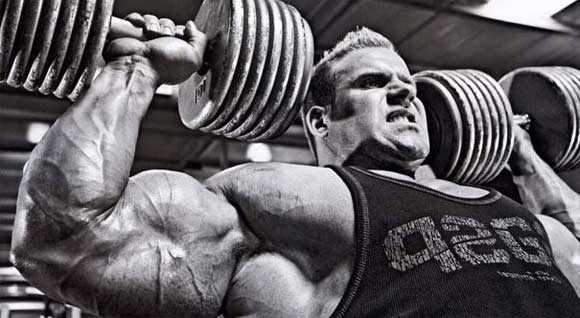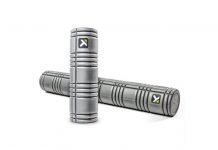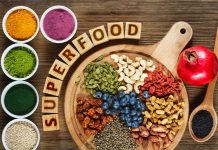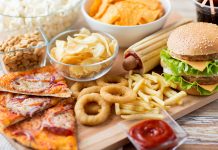
There’s almost as many “tricks” for bulking up efficiently as there are bodybuilders. Many bodybuilders try several methods even during a single off-season. A lot of these “tricks” are a complete waste of time, or worse will actually hinder your progress. Sometimes people get results despite their tricks and shortcuts, making progress even though their methods aren’t optimal.
Some people even abandon all planning and just eat whatever is in front of them without regard for the body fat they are gaining.
This method is a great way to get a huge spare tire that you’ll be kicking yourself for once contest season rolls around and you’re struggling to cut all the excess body fat you gained in the off season.
The truth is that gaining quality muscle mass while putting on as little body fat as possible takes a lot of planning and strategy. As always, patience, dedication and hard work are your greatest assets. If you aren’t keeping a good off season diet and keeping up with your exercise routine, you’re going to set yourself up for failure when it’s time to start competing.
Slow And Steady Bulking
When we start making changes to our routines, we tend to crave quick results so we can see what all this hard work is getting us. Unfortunately, as most bodybuilders are painfully aware, instant gratification is pretty much impossible when it comes to bodybuilding, including when you’re in a caloric surplus.
The rule is to make gradual increases in your calories and macronutrients so that you put on muscle mass while putting on as little excess fat as you can. Adding too many calories will put you right on track for a bunch of extra body fat that will be hell to get rid of and that can seriously delay your goals.
There are a few people with genes that allow them to bulk like this, but chances are you aren’t one of them.
Of course, you are going to gain some body fat in your off season. This is unavoidable. However, you can keep it at a minimum by limiting yourself to a gain of a half pound to a pound and a half each week. Be conservative with your caloric surplus diet. This way you can control your gains, ensuring that it’s mostly solid muscle mass and as little fat as possible.
Cyclical Bulking
Of course, some of your bros at the gym probably think you’re an idiot for wanting to stay lean, telling you to eat big to get big. These guys probably aren’t looking ahead to competitions the way you are, and they probably don’t mind having excess body fat. This is fine for them, but if you want to look your best all year, it’s best to disregard their advice. Putting on too much body fat during the off season means you’ll have a hard road ahead of you when it’s time to get ready to compete.
You’ll have to diet hard for a longer period of time, and you’ll probably end up losing some of the muscle mass you did gain. You’ll also probably have to deal with loose skin from your weight loss. So not only is it an inefficient way of building muscle, even if you do manage to cut all the fat you gained you will still have a serious disadvantage in competition.
All that body fat you gain when you’re not careful with your off season diet can also impact your metabolism. Fat tissue releases hormones and adipocytokines that make your body’s tissues, including muscle tissue, more resistant to insulin. This will make your body more likely to retain and store fat, and it will make it more difficult for your muscles to benefit from insulin.
Insulin makes your muscles absorb nutrients more efficiently after your post-workout meal, preventing your body from using its own protein to repair and build muscle tissue. If your body does not respond as readily to these effects from insulin, it’s likely to impact your growth even more.
A method that works much more reliably for building lean muscle mass and adding little body fat is cyclical bulking. Cyclical bulking involves a long period of bulking, usually anywhere between four to eight months, followed by a period of cutting.
The cutting phase varies between six to eighteen weeks. Obviously, there’s a lot of wiggle room to customize your bulking-cutting plan to fit your needs. Everyone will need something different. It’s likely that your body will start storing excess fat and experience a change in metabolism at a different time than someone else’s body would, even when you’re on the same diet and workout plan. Your needs during the cutting phase will also be different from other people’s, since you will cut body fat at a different rate than others would.

This method has a lot of benefits. It allows you to take advantage of the changes in your body and metabolism that occur when you switch from bulking to cutting. Switching from a caloric surplus to a caloric deficit usually results in a quick loss of body fat, since your body is in a high metabolic state from the caloric surplus. Metabolic hormones have not yet adjusted to your changed calorie intake at the start of your cutting phase, so they continue to burn calories at a high rate, allowing you to burn fat rapidly.
However, your body will eventually adjust to your cutting diet, and fat burning will slow down and eventually stop. This is because your levels of metabolic hormones like T3 and leptin will eventually decline. Since these hormones are responsible for maintaining a high metabolism, when they decline your metabolism will seem to slow down to a crawl! At this point, most people switch back to their bulking diet, since they’ve cut as much fat as they can.
Anabolism During Sleep
When you sleep, you enter a long period of fasting that can actually cause your body to enter a catabolic state, using muscle tissue as an energy and protein source. Just think about it: you keep your body running on a series of small meals throughout the day, but then at night, the schedule is suddenly completely empty. Depending on how much you sleep, you can expect to be in a fasting state for between five and nine hours.
Sleep is not just a period of relaxation, either; your body and brain are doing a lot of work and they need a high nutrient load for this period of repair. Eating about 20 to 30 grams of protein before sleeping can prevent your body from entering the fasting state, and it actually stimulates muscle protein synthesis.
More protein is not better in this case, however. Studies that were conducted to measure the effects of muscle protein synthesis during sleep showed that there was no difference in muscle protein synthesis when people participating in the study ate 20 to 30 grams and 90 grams of protein before sleep. Eating 90 grams of protein has no benefit over 20 to 30 grams.
Quality over quantity applies in this case. If you focus on getting 20 to 30 grams of the right kinds of protein before sleeping, you will maximize your body’s muscle protein synthesis, preventing it from catabolizing valuable muscle protein and allowing it to build and repair muscle tissue more effectively.
The research into the effects of eating protein before sleep is still emerging. Only a few studies about these effects have been conducted, but the data seem solid, and a lot of bodybuilders are seeing an improvement in their muscle gains by applying the data to their diets.
You want the protein that you get to be dispersed into your system in a slow and steady stream, instead of being digested all at once. Slow digesting proteins like eggs, Greek yogurt and casein powder all digest and release slowly. They all also have enough fat to slow down digestion even more while not adding too much to your overall macronutrient intake.
Also read: Unique fat burning formula of Test Stack no. 17 >>
Getting quality protein can be as easy as eating a snack before bed, but if you’re in a bulking period and you feel like you’re constantly eating, adding even more food to your routine might be the last thing you want to do. There are a few ways of getting the protein you need to keep your body in an anabolic state before bed. Some people choose to just eat before bed and be done with it, but others set an alarm for the middle of the night or even just take a protein shake when they get up in the middle of the night to use the bathroom. Whatever method you choose, just make sure that you remember quality over quantity.
Designing Your Bulking Diet
Your off-season diet is a crucial factor in reaching your goals. You can lift and go all out on your workouts all you want, but if you’re not eating right for your goals and needs, you won’t be on the right track to meet them.

Designing a solid diet takes time and patience, like all other areas of bodybuilding. You have to give your body time to make slow and steady gains. If you try to rush yourself, you’re likely to end up putting on a bunch of extra fat, which will slow you down and mess you up come competition season.
Your goals for your off-season bulking should be to gradually add calories (to prevent excess fat), make the greatest gains in muscle mass you can (without adding a high amount of body fat) and to get nutrients as efficiently as you can by timing your meals and nutrient intake.
Your body needs to be in a constant state of calorie surplus to build the amounts of muscle tissue to make great gains. It’s a double-edged sword, of course, since being in constant caloric surplus makes it much easier and more likely for your body to store fat tissue. Deliberate and controlled increases in your calorie intake are needed to avoid adding a lot of extra fat. The best way to do this is by adding calories each week and by timing your meals to meet your body’s immediate needs.
Before we start discussing the best nutrition plans, it’s a good idea to talk about macronutrients and their roles in nutrition. Part of designing your diet is making informed choices, and the more you know about the three macronutrients, the better off you’ll be.
Protein
There a few reasons why protein is so important to the bulking diet. The first, of course, is that the protein you eat provides raw material for muscle protein synthesis. Maximizing muscle growth is one of the goals when bulking, and for that, your body needs a ton of protein. However, when you focus on maximizing muscle protein synthesis, your body will also increase its resting energy expenditure. This will help curtail some of the fat storage your body undergoes when you are bulking.
Introducing more essential amino acids into your diet will help your body maximize muscle protein synthesis. Amino acids are the building blocks of protein, and whatever protein you eat is digested into amino acids before any protein synthesis can occur. When you ingest amino acids in their simplest form, your body does not need to spend time digesting protein to break it down into amino acids. Your body can immediately use the amino acids to build muscle tissue.
Essential amino acids are amino acids that the body can’t produce on its own. They come from the food you eat. Typical people get enough of the essential amino acids from their diets, but bodybuilders often need to take amino acid supplements in order to get enough of the essential amino acids to meet their goals. Adding about ten grams of essential amino acids will keep your body in maximum protein synthesis.
Leucine is the amino acid that seems to be crucial in getting muscle protein synthesis started. Leucine, isoleucine and valine are branched chain amino acids, which are popular in supplements. However, leucine is not the only amino acid that is important in muscle protein synthesis. Your focus should still be on getting quality animal protein, which will by nature be high in leucine.
Timing your protein intake is another issue. Even protein distribution is key in making greater gains in muscle mass. If your protein intake is 90 grams per day, you will get a greater benefit if you space it out in even increments, like 30 grams for breakfast, lunch and dinner.
In one study, people who evenly distributed their protein intake like this built more muscle mass over eleven weeks than people who took their protein unevenly. The participants in the study who took protein in uneven increments had ten grams at breakfast, 20 grams at lunch and 60 grams at dinner. Their bodies were not able to use the protein they consumed as efficiently as the people who evenly distributed their protein intake.
Carbohydrates
Carbohydrates have gotten a bad rap over the past decade or so due to diet fads and a poor understanding of the role carbs play in our diets and in our bodies. Some people store fat from carbohydrates more easily than other people do, so you have to be aware of your body’s response to carbs so that you don’t put on excess body fat.
Carbohydrates are the body’s preferred source of energy and are vital in building muscle mass. When you are in a caloric surplus, it’s important to be aware of your body’s insulin sensitivity. Insulin sensitivity refers to how well your body responds to insulin and how much insulin it takes to induce the body to store glucose.

There are certain times of the day when your body is most sensitive to glucose: immediately after waking up, before and after working out. At these times, your body has usually run out of stored glycogen and it needs nutrients. Simple carbs that you take in during these times will be shuttled directly to the muscles to be stored as glycogen. Insulin is responsible for moving carbs to the muscles during these times. Without the right nutrients, your body will enter a catabolic state and will not enter an anabolic state until it has enough nutrients to do so.
Fiber
Fiber is a complex carbohydrate that is partly made of non-digestible compounds like cellulose. Fiber is digested slowly and causes you to feel fuller for a longer period of time. A high fiber intake also helps with fat loss and to boost your metabolism.
It is recommended that women get 25 grams of protein per day, while men should take 38 grams. These are only guidelines, however. Your needs may be different. Getting too much fiber can prevent nutrients from absorbing into your system, so don’t go crazy thinking that overloading on fiber will help you burn fat.
Fats
Fats are important for a lot of the body’s hormonal processes, for building muscle and other structural tissues and for meeting the body’s energy needs.
Fat increases your body’s testosterone levels, which makes them of chief importance to bodybuilders. Keeping your fat intake above 15% of your daily calories will keep your body’s testosterone levels from dropping, while keeping it above 30% of your daily calories will increase testosterone. It is important to remember to be careful with your fat intake, since you don’t want to start adding body fat.
A fat intake above about 40% of your total daily calories will probably put on too much body fat. In addition, if too much of your calorie intake is fat, you won’t be able to consume as much of the other macronutrients and stay within your calorie budget. Don’t focus too much on testosterone; while it is important, you don’t want to sacrifice other parts of your diet.
Also read: Improve your sex life with VigRX Oil >>
Timing Your Nutrients
Maintaining a good and effective caloric surplus to help you build muscle without storing a lot of fat is a tricky and exact process. It’s kind of a science. Hitting all your macronutrient targets accurately while spreading them out during the day and getting the right nutrients at the right times is going to be what makes you.
Plan to get most of your carbohydrates during your pre- and post-workout meals. Getting carbs before your workout will provide you with energy for your training and will also stimulate your body to release insulin, which will prevent your body from entering a catabolic state.
After your workout, you need to restore your body’s stores of glycogen that were depleted during the workout. This will also help main muscle protein synthesis. A shake that incorporates both protein and carbs before and after your workout can help you maintain the anabolic state you need to keep your body building new muscle.
Meal Frequency
Meal frequency has been a contentious topic for some time. The truth is, what works best for one person may not work for another person, and as your goals change, your needs will change too. When trying to add lean muscle mass, it may be better to eat less frequently than the 5-6 small meal plan that is so popular right now. Eating too often may actually have a negative effect on anabolism. In addition, it may be more efficient to take protein in larger, less frequent feedings.
Muscle protein synthesis continues for about three hours after a meal, and amino acid levels stay high for up to five hours after eating. If you eat more before amino acid levels go down again, you’re just piling more amino acids on top of what is already in your system. It is likely that any amino acids you eat when your levels are already elevated will just be flushed out of your system. Having constantly high levels of amino acids can reduce your body’s sensitivity to them, and may eventually cause a lackluster anabolic response.
Eating less frequently and allowing your amino acid levels to decline between meals before loading up again can keep your body sensitive to them and will not lessen the anabolic effect.
Eating every two to three hours also makes your body used to frequent increases in your blood sugar level. Less frequent meals will keep your body’s response to glucose spikes more sensitive, making the insulin response more efficient.
Having less frequent meals is not going to leave you scrawny and emaciated. Your metabolism just has to adjust to your new feeding schedule. Again, there are no concrete rules about diet, including meal timing and frequency. Finding what works best for you is always best. The off-season is a good time for trial and error, since you never know if there’s some way your routine is best unless you try other things.
Cooking
At some point during your bulking phase, you’ll probably feel like your whole life revolves around food. But again, you can train as hard as you want, but without whipping yourself into shape regarding your diet you aren’t going to get the kinds of gains you want.
Cooking in bulk is a tried and true method of making sure you get all your macro-nutrients. It takes a lot of time (basically your entire Sunday), but in the end it’s a time saver. You’ll be able to function during the week without having to drop everything and cook four or five meals every day.

Cooking all your meals and storing them in plastic storage containers until you need them is the way to go during bulking season. You’ll thank yourself every time you can just reach in the fridge and grab your breakfast, lunch and snacks on your way out the door in the morning, and when you do the same at night for dinner.
Calculating Your Calorie Needs For Bulking
Here are a few guidelines for you to follow when trying to find your caloric needs:
● Find your baseline. Track your diet for about one to two weeks before it’s time to start bulking so you know what your nutrition currently looks like. You are trying to design your diet around your current metabolism.
● Adjust to a less frequent mealtime schedule. Evenly distribute your calories and macro nutrients over 4 to 5 meals.
● Get enough protein for muscle protein synthesis at each meal.
● get 20 to 30% of your total calories from fat every day.
● Increase your carbs gradually each week.
● Endomorphs (people with slow metabolisms who tend to store fat easily) should multiply their body weight by 13 or 14 to get their bulking calories. Ectomorphs (people with fast metabolisms who lose fat easily) should multiply body weight by 16,17 or 18. Mesomorphs (people with average metabolism) should multiply body weight by 15.
Endomorphs: People With Slow Metabolism
When bulking, aim for 1.2-1.35 grams of protein per pound of body weight and .4-.6 grams of fat per pound of body weight. Adjust your carbs to fit in to the rest of your caloric needs.
To cut, get 1.35-1.5 grams of protein per pound of body weight and .3-.45 grams of fat per pound of body weight. Fill out the rest of your daily calories with carbs.
Ectomorphs: People With Fast Metabolism
To bulk, consume 1-1.25 grams of protein per pound of body weight and 0.3-0.5 grams of fat per pound of body weight. The rest of your daily calories should come from carbohydrates.
To cut, get 1.2-1.35 grams of protein per pound of body weight and .25-.4 grams of fat per pound of body weight. Get the rest of your daily calories from carbs.
Mesomorphs: People With Average Metabolism
When bulking, get 1.1-1.3 grams of protein per pound of body weight and 0.3-0.45 grams of fat per pound of body weight. Fill in the rest of your daily calorie needs with carbohydrates.
To cut, get 1.15-1.35 grams of protein and 0.2-0.4 grams of fat per pound of body weight. Get the rest of your calories from carbs.
Quality Macro Nutrient Sources
When bulking and cutting, quality and quantity are equally important. Getting the right amount of nutrients from the right sources is paramount: if all your carbs are coming from refined flour, for instance, you will probably store a lot of extra fat and your metabolism will slowly grind to a halt.
Good protein sources include lean, low fat meats. Pork, chicken, turkey and beef are all excellent sources of protein and high in the essential amino acids like leucine that are critical for jump-starting muscle protein synthesis. Beef is also a good source of saturated fat, which is necessary for proper hormone function. Eggs and low or non fat cheese are also good sources of protein. Fish like tuna, tilapia and salmon are all high in omega fatty acids.
Good fats mostly come from plant sources. Although some saturated fat is necessary, most of your fats should be unsaturated fats, like fats that come from nuts and plant oils. Olive oil, flax seed oil and primrose oil are all good sources of unsaturated fat, as is avocado. Salmon is especially good for omega 3 fatty acids. Many fish are good sources of healthy fat.
Most of your carbohydrates should come from complex carbohydrates like whole grains and vegetables. These foods are high in fiber so they take longer to digest,which prevents the rapid insulin spike that results from eating a lot of simple carbohydrates. Fruits also have some fiber, but they are also high in simple sugars, so limit your fruit intake to 2 to 3 servings a day.
Beans are high in protein and fiber, and a good source of carbs as well. Whole grains like steel cut oatmeal, whole wheat pasta and bran cereals are good replacements for the refined versions of these foods and are easy to fit into your diet. Substituting sweet potatoes for white potatoes is a smart move as well, since white potatoes are high in simple starches.
Read our full review about one of the best bodybuilding supplements: Crazy Mass >>




























I love the fact that I can take things real slow and bulk up on my own pace. I sort of like going slow and then all of a sudden I look in the mirror and BOOOOOM muscles 🙂 Thanks for the guide!
Is there any possible way that a vegetarian could bulk up like this with your guide? I know a lot about building muscles is getting the right foods and one of those is MEAT. What do you think?
Wow, such beautifully symmetrical people 🙂 I wish I had some muscle mass to build from. I have always had a small frame and was made fun of it for many years in my life. Just a little bulk would do my body a world of justice!
Comments are closed.